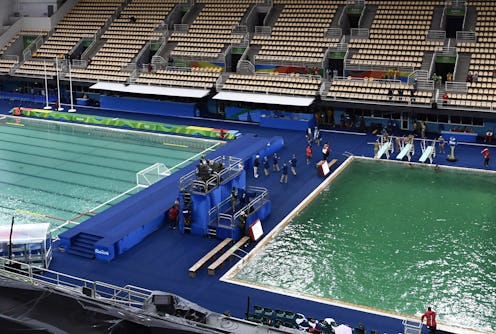Life
Why Did The Olympic Diving Pool Turn Green?
The 2016 Olympics in Rio have had no shortage of astonishing athletes (I'm looking at you, Simone Biles); but someone else — or rather, something else — stole the show earlier this week: An Olympic diving pool, which turned a rather curious shade of green. Obviously, we're all asking the same question: Why did the Olympic diving pool turn green? Is it a fungus? Did someone slip some food coloring in it? Is it safe to swim in? What happens if one of the swimmers accidentally swallows some of the water?
Everyone can thankfully simmer down a little, because FINA (the Fédération Internationale de Natation, or in English, the International Swimming Federation) confirmed to Mashable that the water is safe. They also explained what exactly happened: "The water tanks ran out of some of the chemicals used in the water treatment process. As a result, the pH level of the water was outside the usual range, causing the discoloration," they told the website. After testing the waters, they concluded that no risk was posed to the athletes, and the competition could continue on as planned.
And what a relief that is, because by Wednesday, the water polo pool and synchronized swimming pool also started turning green. Rest assured that it's just due to the drop in the water's alkalinity, which spurred an increase in algae.
Gross? Yes. Threatening? Apparently not.
The one part that stinks is that now the water is allegedly causing a burning sensation in some swimmers' eyes due to the added chlorine. However, according to the Washington Post, Rio officials say that both the chemistry of the pool in general and the chlorine levels in particular "are within the required standards."
All things considered, though, I guess it's a relatively minor snafu when you think about other things that could've gone wrong. Hopefully the Olympic pools will return to their regular shade of gorgeous blue soon.
In the meantime, Ryan Lochte's blue-green hair now matches the water flawlessly.
